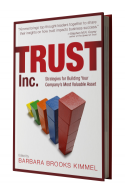Are your actions ethical? What impact are they having on others? Is unethical behavior just “business as usual?”
I recently followed a LinkedIn group thread containing the following discussion topic: In the personal life of an ethics professional, do the same standards apply as in their professional life? A debate ensued, with many taking the position that “it was just a job” no different than any other profession. In other words, “all bets were off” outside the office. As disappointing as this might seem, it was not particularly surprising. I see similar attitudes and behavior among trust professionals. Maybe we all need an occasional reminder of what makes for ethical and trustworthy behavior, both in and outside the office. Here are a few thoughts taken from real-life examples:
- Lose your “me first” attitude.
- Stop belittling others.
- Don’t claim honors and awards that you did not earn.
- Don’t make “side deals.”
- Do your own “dirty work.” Don’t send a soldier to do it for you.
- Don’t help yourself to the copyrighted content of others without asking.
- Leave your ego at the door. You may not be the smartest person in the room.
- Tell the truth.
- Keep your word.
- If you are not sure your actions will be viewed as ethical or trustworthy, ask before proceeding.
I believe we all have a personal and professional obligation to hold ourselves to high standards, to be role models and to exhibit integrity and character. We have an obligation to walk our talk. We have an obligation to lead with trust. Stop and consider whether your actions are ethical and the impact they will have on others. A lack of trust and ethics should not be viewed as “business as usual.” It’s just bad business.
For more information about organizational trust, please visit our website at www.trustacrossamerica.com You may also be interested in our new book, Trust Inc.: Strategies for Building Your Company’s Most Valuable Asset
What are some additional trust busters that you would like to see added to this list? Feel free to leave a comment!
Barbara Brooks Kimmel, Executive Director, Trust Across America-Trust Around the World




To have credibility, there must be integration in what you say and what you do in all aspects of your life, not just in your day job. Important post.
Karin- thank you for taking the time to reply. What appears so “basic” to many of us seems to allude others. Have a great day.
It is just so CONGRUENT to act in a trustworthy manner. It seems to minimize so many ideological conflicts when one is consistent in actions and attitudes.
Cognitive Dissonance was Leon Festinger’s term for the gap that results when there are differences between ideals and actuals.
One would think that thinking about one’s behavior that is inconsistent with their expressed attitudes and ideals would create a continual stress for most people. Cognitive Dissonance was thought to be a motivational factor to close the perceived gap.
Do “misbehaving” people just not see the gap? Is that a knowledge or perspective issue? In sociopathic personalities, it would not be a problem since everything is internally anchored to one’s beliefs about the world. But how about the rest of us? If we KNOW we behaved in an untrustworthy manner against our own talk, does that not generate dissonance?
Why do people not even want to TALK about trust?
.
Hi Scott- your last question is the easiest to answer. It’s not that they don’t want to talk about trust, but rather that most people take trust for granted. They just assume it’s there. In reality, trust is built in deliberate and incremental steps.